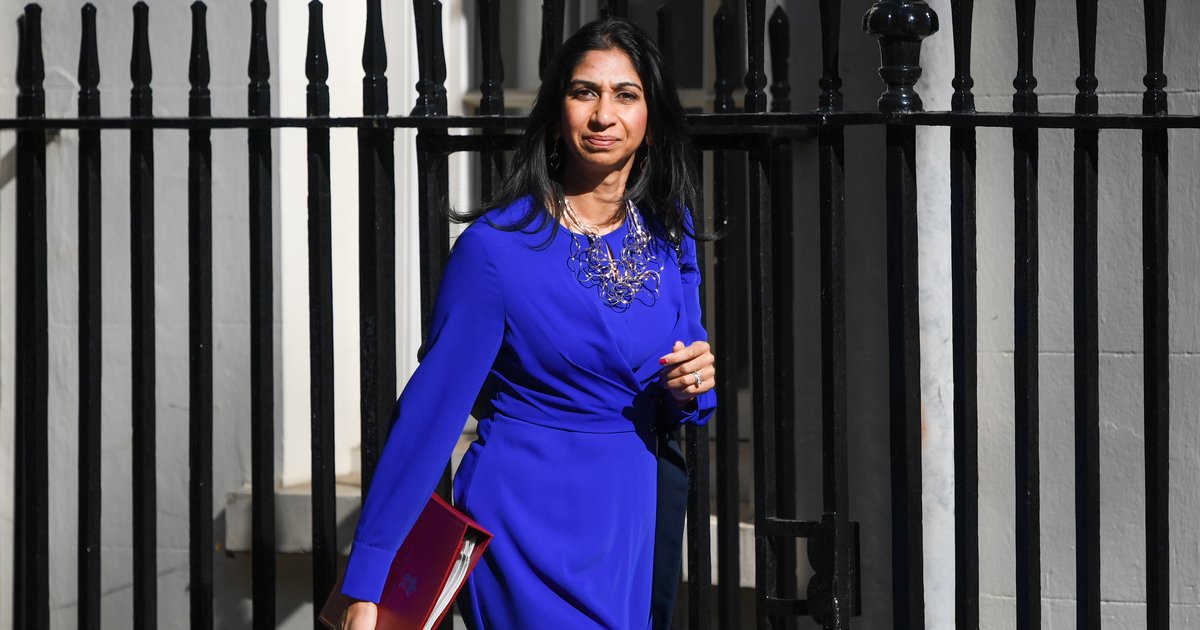Actually Suella, small boats are the only option. Here’s why

Suella Braverman this week took to the airwaves to declare "there is no good reason for anybody to get into a small boat". The home secretary then suggested those fleeing Sudan should seek asylum in the UK through the UN Refugee Agency - a route the UN Refugee Agency then pointed out does not exist[1].
Hearing these comments really jarred. Last week I was in Dunkirk meeting people attempting to reach the UK by small boat.
I saw the ways in which the GBP63m package from the government[2] is being used by French police patrols to destroy boats, slashing through them and forcing people to sleep in bus shelters, soaked through, after a failed attempt to cross the Channel. The increased police presence is now pushing people further round the coastline[3] - in some cases, as far as Normandy - to make longer, more dangerous crossings.
All safe routes are effectively closed. The Afghanistan Citizens Resettlement Scheme has been an utter failure[4], bringing only a handful of people who worked with or alongside the British government to the UK in the first eighteen months.
And there have been no suggestions a resettlement programme will be opened for those fleeing Sudan. No good reason to get in a small boat? There is no choice but to get in a small boat.
The conditions in the camps are dire.
There's no shelter, no drinking water, no food. Recently, the French riot police have started to hack down trees, preventing migrants from taking shelter from the driving rain and the biting winds. Yesterday morning an Iraqi Kurdish family sent me pictures of their tent after it had been destroyed.
I asked where they had slept. "Here, on this land," said the mother, with a picture of her two children standing in front of barren wasteland, ripped plastic bags attached to the shrubbery behind them. They have been there for over six months.
Help us uncover the truth about Covid-19[5]
The Covid-19 public inquiry is a historic chance to find out what really happened.
Make a donation[6]A 20-year-old radiology student from the Tigray region of Ethiopia had attempted to get in a boat seven times in nine days. One night, when the winds were calmer and the waves lower, she tried three times.
Every time, the French police came and slashed through the boat. "No need to run - they already got us," she told me, fearlessly. "But one time they won't - we just need one time."
Many of those I spoke to said when they returned to the camps after a failed attempt to cross, they found their tents had been slashed through, poles broken and belongings removed. Calais-based charity Human Rights Observers showed me video evidence of locals and members of the authorities stabbing through water tanks to deter migrants from settling there, leaving children as young as two without drinking water. Police frequently arrest people on no fixed abode charges; when I was there, a mother was arrested and separated from her children for over 24 hours.
Aid workers spent the day calling the police, lawyers and hospitals to find out where she had been taken.
After each eviction, a coach - usually one, but sometimes more - waits on the dirt track beside the camp to take people to Lille, where they can claim asylum in France. Many do, while others return to Calais, Dunkirk and the surrounding areas and continue their attempts to cross the Channel. For some, that's because they have family or friends already in the UK, they speak English but not French, or previous asylum claims in France have failed.
There are myriad reasons why someone may choose not to stay in France, or can't.
Meanwhile, the French state provides nothing - no drinking water, food or shelter - leaving small grassroots groups to fill the vacuum. The government says France is a safe country; these evictions, physical and verbal harassment, intimidation, arbitrary arrests and neglect of basic humanitarian assistance show it's not.
These spaces can't be said to be refugee camps. There are no UN agencies - no UNHCR, no World Food Programme, no IOM - and no major international aid organisations present in northern France.
Without reaching the UK to claim asylum (which, contrary to the home secretary's remarks, is the only way to claim asylum here) and with no pending claim in France, they are not asylum seekers. They're also not refugees in legal terms, because they haven't been granted refugee status in another country or had their claims assessed and confirmed by the UN. They are considered migrants and therefore not eligible for even the most basic provision, or so it would seem.
So what can they do?
Remain in the camps without running water, shelter and sanitation, or attempt to cross? It's not much of a choice.
On a wall running parallel to the camp, next to a train track and a road barricaded with rocks, are scrawled slogans from current and previous inhabitants. As I drove away and began my safe passage to the UK - a journey everybody there is so desperate to make - I saw one I hadn't noticed before.
I stopped quite literally in my tracks.
It read: "Anywhere but here."
References
- ^ then pointed out does not exist (www.unhcr.org)
- ^ GBP63m package from the government (www.independent.co.uk)
- ^ further round the coastline (inews.co.uk)
- ^ utter failure (www.theguardian.com)
- ^ Help us uncover the truth about Covid-19 (support.opendemocracy.net)
- ^ Make a donation (support.opendemocracy.net)